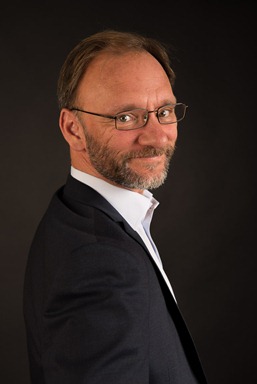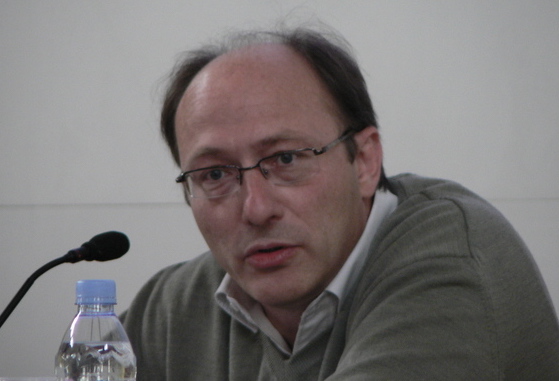
IMPEC 2018 Conference > Plenary SpeakersMathias BrothLinköping University, Sweden
Mathias Broth is professor at the department of language and culture, Linköping University. He has published several texts on the work of a French-speaking television crew, focusing in particular on the mediated interaction that takes place between, on the one hand, the director and the production assistant in the control room, and, on the other hand, the camera operators that are placed in the studio. He is one of the editors of a recent book on video practices in a wide variety of ordinary and professional social settings, Studies of Video Practices : Video at work (Routledge 2014). At Linköping University, Mathias Broth gives courses in conversation analysis, linguistics and French. Accomplishing the invisibility of camera operators in TV-production Building on previous work in ethnomethodology, conversation analysis and multimodal interaction analysis on centres of coordination, media interviews and video work, this presentation explores, using EMCA methodology, the situated practices through which a French TV-crew make cameras invisible and camera-work unnoticeable to viewers. The analyses are based on multiple camera video recordings of the French monthly debate show Rideau Rouge, broadcast live on TV5 International between 2002 and 2005. Broadly speaking, two aspects of camera shots may attract attention to camera operators. A first one relates to the content of shots: camera operators or recording equipment that become visible in another camera operator’s shot instantly gives the production crew away. A second aspect relates to the way the shooting is done: hasty, unfocused or otherwise “unfinished” shots likewise indicate to the audience that there is someone operating the camera. The director of the show, who ongoingly monitors operator shots as they appear in the bank of screens in the control room, very much avoids putting such shots on the air, and the five camera operators maximize the time when their shots are stable, whether or not the team is currently broadcasting live. On occasion, small accidents nevertheless happen, and we can thereby observe the manifest practices through which the team collaboratively address the problem of making the work of TV-production invisible. Jacques Ibanez BuenoUniversité Savoie Mont-Blanc
Jacques Ibanez Bueno, Professeur des Universités en Sciences de l’Information et de la Communication à l’Université de Savoie Mont-Blanc, a cofondé une filière LMD en Hypermédia et Communication et un Groupe Inter-Laboratoires sur l'Image la Communication et les Arts Numériques (G-SICA) intégrée au LLSETI (Laboratoire Langages Littératures Sociétés Etudes Transfrontalières et Internationales). Ses recherches portent sur l’appropriation des usages émergents de technologies iconiques en mobilisant les Visual Methods. Il publie en 2016 un livre intitulé "le corps commutatif : de la télévision à la visiophonie". Interactions corporelles par les écrans : contributions phénoménologiques et interdisciplinaires Audacious phenomenologists such as Maurice Merleau-Ponty marked at least one generation by their proposals on our bodily relation to the figurative painting or the photographic image. Within an epistemological filiation, crossing a partial re-reading of fundamental texts and phenomenological works that question our corporeal relation to animated and / or interactive images proves fertile. The understanding of the immersion modalities as an extension of the body via joystick-type interfaces or smartphone is improved. To this end, sensorimotor and narrative levels must be considered. Charles Lenay Université de Technologie de Compiègne
Charles Lenay, professeur de sciences cognitives et de philosophie des sciences, directeur puis directeur adjoint de l’équipe COSTECH (Connaissance, Organisation et systèmes Techniques) à l’Université de Technologie de Compiègne. Habilité à diriger les recherches en Philosophie (17e) et en Histoire des sciences (72e), il consacre l’essentiel de ses recherches aux technologies cognitives : comment les outils participent à l'activité cognitive : raisonnement, mémorisation, perception, interaction,... Dans le cadre de recherches sur l’autonomie des personnes aveugles ou malvoyantes, il a mis en place un paradigme de recherche expérimentale sur les prothèses perceptives et a développé l’internet tactile. Il travaille actuellement sur les conditions techniques des interactions perceptives et sur la constitution de valeurs émotionnelles partagées. Après avoir été vice-président de l'Association Française pour la Recherche Cognitive (ARCO), et avoir animé diverses équipes d'enseignement et de recherche, il a créé le Groupe Suppléance Perceptive maintenant devenu CRED (Recherche Cognitive et Design de l’Enaction) qui est une des trois composantes de l'Unité de recherche COSTECH. Touching Body - Touched Body: The Experience of Separation If one cannot touch without being touched how to understand that one can see without being seen? Through a minimalist experimental study of perceptual crossings we will show how to study the constitution of the distance that separates us.
|
| Online user: 1 | Privacy |

|


